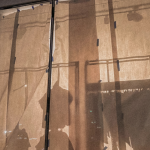I don't know how often people have said, "If I had money, I would buy local fashion, but for the moment, I will continue using Shein." I've heard it from friends, influencers, and strangers on a night of drinks. That is like an employer saying, "If I had a lot of money, I would pay decent wages, but since I don't, I won't." It simply does not make sense, mainly because those who usually make these comments are people whose resources would often allow them to take a different path, and, furthermore, they are the same people who denounce that certain local companies exploit workers.
I consider myself coherent and care as much about employers in my country respecting labor laws as employers in other countries.
So, when someone tells me that, I want to believe that they are only interested in dressing and that clothes will not mean something special in their life. Still, I don't tolerate it in someone who has a relationship with clothes, is dedicated to the fashion industry, is a model, is a designer, or enjoys dressing.
When clothes are essential to you, as they are to me, that an outfit can completely re-signify my day, the origin of those clothes is critical.
I don't want to be proud of my appearance if it means poor wages, exploitation and abuse, abuse of other people and the environment, by the way.
My main problem with Sheinwhich is not fast fashion but what follows it, is everything I have read and the amount of information regarding its need for respect for labor rights. I don't care how much it costs; I'm not going to use it if there are so many signs of labor exploitation involved. It may cost 10 dollars for you, but it could cost as much life for someone else.
I hope you had the opportunity to see "Untold: Inside The Shein Machine," the documentary that reveals the inhumane working conditions at Shein, but if you have not seen it, here is a brief summary:
Iman Amrani, a journalist for Channel 4, a broadcast television channel from the UK, infiltrated the Shein factories posing as a worker and (at this point, we act surprised) found that the employees worked 120-hour days a week, even though Chinese labor law establishes a maximum of 8 hours a day.
Despite this, the salaries are ungrateful; we are talking about 4,000 yuan a month for producing a minimum of 500 garments daily, with barely one day off a month. The reported salary is less than the cost of a studio apartment in remote city areas, which is around 4,400 yuan. Let's not talk about how much it costs to rent a family home.
According to the documentary, its workers are exploited, fundamental rights do not exist in the work environment, they carry out their work on exhausting days, and lack minimum rest. Shein proclaim being attached to legislation and international treaties.
I'm not surprised that some still defend Shein because of the cost of their product, but I like to think that knowledge about what exists behind that low cost could change their minds. Have they thought at whose expense? At the expense of the health of its workers, of their quality of life, at the expense of necessity.
Based on the above, I share my exhaustive list to leave ultra-fast fashion gradually. You must carefully follow the order for it to make sense.
- Find your own style. You are not a photocopy; you have ideas and creativity. Your body is unique, and what you would like to project to others is personal and unique. Express your authenticity in your clothes, and then you will stop the need to buy everything these companies offer you to buy what has to do with you.
- Bet on used clothes. Some ways to call these stores are Thrift Stores (USA), Tianguis (Mexico), and Americanas (Costa Rica). There are stores where you can buy good quality clothes and shoes, even brand names, for cheap prices. There is usually so much clothing that there will always be pieces that match your style; it is a matter of having time to search.
- If you have more resources, look for vintage stores in your city. It usually costs a little more, but it will be very stylish, curated, high-quality clothing that employs people who are sustainably dedicated to this industry.
- Use Facebook Marketplace to find clothes someone else sells or trades near you. You can thus get rid of the pieces you no longer need, obtaining others that are now more connected to your style without moving great distances. You can use this in practically all cities in the world.
- Local design. In your city, there must be several designers who do artisanal work in the production of their products. Indeed, several of them have something like you, represent your style, and whose pieces you can adapt to the rest of your closet to create beautiful outfits.
- Last but not least, you are a human being with intelligence and reason. Do not promote a market you would not like to be part of or a company you would not want to work for or have your family do.
Sources of information:
China. Labor rights and work situation, 2020. Download link: https://cedla.org/publicaciones/ieye/china-derechos-laborales-y-situacion-del-trabajo/
SHEIN: TOXICITY AT FULL RAGE, 2020. https://es.greenpeace.org/es/noticias/shein-toxicidad-a-todo-trapo/#:~:text=Estaindustriahoyesresponsable,personasdurantetodounao.
Dejarse la piel por Shein, Public Eye, 2021. https://www.business-humanrights.org/pt/latest-news/china-report-finds-workers-supplying-shein-working-long-hours-under-piece-rate-system-and-poor-health-safety/
China: Report finds workers supplying Shein working long hours under piece-rate system and poor health & safety, 2021. https://www.business-humanrights.org/pt/latest-news/china-report-finds-workers-supplying-shein-working-long-hours-under-piece-rate-system-and-poor-health-safety/
Untold: Inside The Shein Machine, 2022. https://www.channel4.com/programmes/inside-the-shein-machine-untold


Leave A Reply